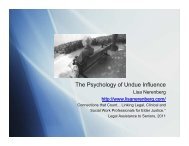Undue Influence: Definitions and Applications - California Courts ...
Undue Influence: Definitions and Applications - California Courts ...
Undue Influence: Definitions and Applications - California Courts ...
Create successful ePaper yourself
Turn your PDF publications into a flip-book with our unique Google optimized e-Paper software.
Association, 2008). Naimark (2001) suggests that courts’ reliance on cognitive capacity<br />
assessments stems from the fact that capacity is measureable, whereas such factors as emotional<br />
vulnerability <strong>and</strong> dependency, power differences between victims <strong>and</strong> influencers, <strong>and</strong> the<br />
pressure that perpetrators bring to bear on their victims are more difficult to calibrate.<br />
In general, that which can be measured is given great weight <strong>and</strong> that which cannot be<br />
measured is given less weight. In the case of undue influence, this approach may lead to<br />
missing an important aspect of the analysis.<br />
The emerging literature on fraud suggests that extremely subtle cognitive impairments<br />
increase vulnerability to certain types of fraud. For example, a recent study Jacoby, Bishara,<br />
Hessels, & Toth (2005) suggests a link between memory deficits <strong>and</strong> vulnerability to scams.<br />
Shulman et al (2007) suggest that the relationship between cognitive capacity <strong>and</strong><br />
susceptibility to undue influence is directly proportional. That is, the lower an individual’s<br />
cognitive status, the less pressure is needed to undermine their will. Conversely, a highly<br />
functional individual requires a higher level of pressure or persuasion.<br />
Other cognitive impairments that are believed to heighten vulnerability to undue<br />
influence stem from developmental disabilities <strong>and</strong> mental illness. Spar, Hankin, & Stodden<br />
(1995) suggest that mania, which impairs judgment <strong>and</strong> impulse control, heightens susceptibility.<br />
Other mental health problems that are believed to increase susceptibility to undue influence<br />
include depression, anxiety, <strong>and</strong> substance abuse.<br />
Some have suggested that “characterologic weaknesses” or personality disorders may<br />
also contribute to vulnerability. Dependent personality, in particular, has been frequently cited<br />
(Hall, Hall, Myers, & Chapman, 2009; Turkat, 2003).<br />
The Diagnostic <strong>and</strong> Statistical Manual, DSM-IV, defines persons with dependent<br />
personality disorder as individuals who are emotionally dependent on other people <strong>and</strong> who<br />
spend great effort trying to please others (American Psychiatric Association, 1994). Individuals<br />
diagnosed with the disorder tend to display needy, passive, <strong>and</strong> clinging behavior, <strong>and</strong> have a<br />
fear of separation. Other common characteristics associated with dependent personality disorder<br />
include:<br />
94




